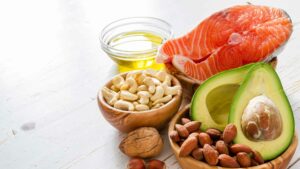Gallbladder, Hypothyroidism and Fat Digestion
 Because you’re reading this, you may be struggling with a thyroid disorder. You may be dealing with gallbladder issues. Or- maybe you’re just genuinely curious how the gallbladder and thyroid– two tiny little organs– are related. Whatever the case may be, I’m glad you’re here investing in your health!
Because you’re reading this, you may be struggling with a thyroid disorder. You may be dealing with gallbladder issues. Or- maybe you’re just genuinely curious how the gallbladder and thyroid– two tiny little organs– are related. Whatever the case may be, I’m glad you’re here investing in your health!
It’s crucial we understand the relationship between the gallbladder and the thyroid, and how you can best support each of them to optimize your well-being.
Sometimes, gallbladder disease or removal can affect thyroid function and can lead to hypothyroidism. On the flip side, people struggling with thyroid issues may also end up with gallbladder problems. If you have a thyroid condition like Hashimoto’s, having gallstones is more common than you think.
As a integrative nutritionist specializing in gallbladder health, I know the importance of nourishing our bodies– especially when something’s not working right. I’ve gone through my share of issues with my own gallbladder. But diet changes and lifestyle modifications can make a world of a difference.
Now I ensure others have the tools they need to be their best selves when dealing with gallbladder issues– whether they’re issues with your gallbladder alone, or with your thyroid function as well.
Let’s start by explaining what the gallbladder and thyroid do for your body, then we’ll dive into the relationship between them.
What is your gallbladder and why is it important?
Your gallbladder is a small organ that stores and releases bile into the small intestine, which is essential in dietary fat digestion. So, gallbladder issues can limit your body’s ability to absorb fat and fat-soluble vitamins A, D, E, and K.
…If you have fat malabsorption, you may experience symptoms like:
- Bloating, cramping, and gas after eating, especially fatty meals
- Diarrhea
- Loose, greasy, foul smelling, light colored stool
- Nausea with fatty meals
- Constipation
- Non digestive symptoms: hair loss, dry skin, brittle nails, rashes, dandruff, hormone imbalance
- Symptoms related to nutrient deficiencies: Eventual signs of vitamin deficiency, like bleeding gums and nosebleeds (Vitamin K), weak bones and bone pain (Vitamin D), or night blindness (Vitamin A)5
Why Is Your Thyroid Important?
The thyroid gland is a butterfly-shaped gland in the neck. It produces hormones that affect virtually every function in the body. These hormones are triiodothyronine (T3), tetraiodothyronine (T4) and calcitonin.
T3 and T4 increase metabolism, body temperature, pulse rate, and nervous system activation. Calcitonin is involved in calcium and bone metabolism.1
When the body produces an abnormal amount of thyroid hormone, you get either hyperthyroidism or hypothyroidism. Having hyper or hypothyroidism can significantly affect how your body functions.
What Is Hyperthyroidism?
Hyperthyroidism is when your body produces too much thyroid hormone. It’s detected through lab testing for thyroid hormone levels in the blood. You may recognize symptoms or a pattern of concerns that could suggest hyperthyroidism.
If you have hyperthyroidism, you may experience symptoms like:
- Heart palpitations or an elevated heart rate
- nervousness and anxiety
- Excessive energy
- Urinary frequency
- Sensitivity to heat
- Sleep difficulties
- Swelling in the neck where the thyroid’s located
- Excessive sweating
- Red palms
- Hives
- Hair loss
- Unexplained weight loss
- Red or dry eyes2
What Is Hypothyroidism?
Hypothyroidism is the exact opposite of hyperthyroidism. It’s when your body doesn’t produce enough thyroid hormone. It too can be diagnosed by lab testing. If you notice frequent symptoms of hypothyroidism, notify your doctor.
Some symptoms of hypothyroidism are:
- Depression and fatigue
- Slow thinking and memory issues
- Slow heart rate
- Dry skin, hair loss on the head and eyebrows, brittle nails
- Sensitivity to the cold
- Unexplained weight gain
- Muscle aches
- Constipation
- Low libido
- Tingling in the hands and fingers
- Irregular or heavy periods
- Puffiness in the face
- Hoarse voice3
How Are the Gallbladder and Thyroid Connected?
If you have a thyroid condition, chances are, you could have problems with your gallbladder as well.4 There’s a bidirectional relationship between the gallbladder and thyroid hormones, meaning an issue in one can affect the other.
Here are some examples of the cause-and-effect relationship between the gallbladder and the thyroid:
- If there’s insufficient T4 hormone due to a thyroid issue, the release of bile from the gallbladder is impaired, which can contribute to the formation of bile duct stones and gallstones.6
- Disorders of lipid metabolism are common in thyroid disease. An increase in cholesterol synthesis and absorption of cholesterol has been found in individuals with hypothyroidism.
- A lack of T4 in hypothyroidism causes decreased liver cholesterol metabolism. This can alter the composition of bile, thickening it and increasing the risk of cholesterol gallstones.7-10
- Because of fat malabsorption due to impaired gallbladder function, essential fatty acids and fat-soluble vitamins A, D, E, and K are not absorbed properly. Vitamin deficiencies and fatty acid deficiencies can impact hormone health and thyroid function.5,12
- With gallbladder issues, toxins can build up in the body since the liver and gallbladder play a role in the digestion and excretion of waste. These toxins can disrupt thyroid health and may be a cause of Hashimoto’s– an autoimmune disorder of the thyroid.11
- Poor gut health can result from impaired bile flow as it can lead to bacterial imbalances. Our gut is essential in the absorption of minerals needed for thyroid health, including iodine, selenium, zinc, and iron. We need selenium and zinc to convert T4 to T3.12
As you can see, thyroid and gallbladder health are very much related. An issue in one can commonly disrupt the other.
4 Steps to Improving Your Thyroid and Gallbladder Connection
So, how can you better your health if you have gallbladder or thyroid issues? If you’re wondering what you can do to improve the thyroid and gallbladder connection, here are a few action steps you can take right away!
1. Improve Your Gut Health
Improving your gut health starts with a combination of prebiotics, probiotics, and diet modification.
Prebiotics are food or supplements for our beneficial gut bacteria. Probiotics are these beneficial bacteria themselves.
Diet modifications that can help restore the gallbladder and thyroid relationship include:
- Fermented foods and drinks as tolerated like kombucha, yogurt, sauerkraut, or kefir
- Limiting processed foods and added sugars
- Drinking at least half your body weight in ounces of water daily
- For example, if you weigh 160 pounds, try drinking at least 80 ounces of water daily!
Unfortunately, there is no one-size-fits-all probiotic that works for everyone. If you have questions, talk to your healthcare provider about what probiotic or supplement is best for you.
2. Reduce Stress
Easier said than done! We know that minimizing stress is essential for our health. But it can be especially beneficial in promoting the health of our gallbladder and thyroid.
A few simple stress-reducing activities include:
- Mindful meditation
- Breathwork
- Low impact exercises
- Gentle stretching and yoga
- Walking outdoors
- Journaling
- Reducing caffeine intake
Adding a few of these simple stress relievers to your day can improve your overall health while helping improve your gallbladder-thyroid connection.
3. Balance Blood Sugar
Blood sugar balance is vital for hormone health. If you’re someone who tends to skip meals or go hours without eating, it’s likely your blood sugar levels are unbalanced.
For balanced blood sugar, focus on what you can add versus take away.
- Add a scoop of collagen protein to your morning coffee
- If you’re craving carbs, make sure to eat protein with it to balance out blood sugar
- Eating every 3-4 hours can help level out blood sugar and reduce energy crashes while supporting thyroid health
4. Support Bile Flow
There are many ways to naturally support bile flow and production. Supporting your liver through lifestyle and diet changes can naturally enhance bile function.
- Bitter foods like dark leafy vegetables, beets, artichokes, and dandelion can help stimulate bile production
- Dandelion root tea, lemon tea, and celery juice are examples of drinks that can enhance bile flow and production

- Castor oil packs to support liver health, constipation and bile flow https://shop.queenofthethrones.com/gallbladdernutritionist
- Take supplements with bile salts like choline, glycine, and taurine to help build bile naturally
Supporting bile flow– and gallbladder health in general– usually comes down to incorporating healthy foods, drinks, and supplements into your diet. And a nutritionist can guide you in crafting the perfect meal plan for you to optimize your health and improve your gallbladder and thyroid relationship.
Start Improving Your Gallbladder and Thyroid Connection Today!
Now that you have some tips on how to effectively support your gallbladder and thyroid connection, it’s time to start implementing them. If you’ve had a gallbladder removal it could affect your thyroid function. If you’ve been diagnosed with hyperthyroidism or hypothyroidism, your gallbladder could suffer consequences.
It’s incredible how linked our body is. And that’s why it’s essential for us to understand how we can improve connections between its different parts– like the gallbladder and the thyroid.
If you’ve tried any of these tips, I’d love to hear from you! Comment below with your thoughts or successes.
And most importantly, if you’re struggling with implementing lifestyle changes or sticking to a healthy meal plan for your gallbladder or thyroid, I want to help you! Connect with me today to discuss how I can best help you reach your health and diet goals. I can’t wait to support you throughout your journey to optimizing your health.
References
- How Does the Thyroid Gland Work? Institute for Quality and Efficiency in Health Care (IQWiG); 2018.
- Overactive thyroid (hyperthyroidism) – Symptoms. nhs.uk. Accessed November 30, 2022. https://www.nhs.uk/conditions/overactive-thyroid-hyperthyroidism/symptoms/
- Underactive thyroid (hypothyroidism) – Symptoms. nhs.uk. Accessed November 30, 2022. https://www.nhs.uk/conditions/underactive-thyroid-hypothyroidism/symptoms/
- Völzke H, Robinson DM, John U. Association between thyroid function and gallstone disease. World J Gastroenterol. 2005;11(35):5530-5534. doi:10.3748/wjg.v11.i35.5530
- Malabsorption. Cleveland Clinic. Accessed November 30, 2022. https://my.clevelandclinic.org/health/diseases/22722-malabsorption
- Laukkarinen J, Sand J, Aittomäki S, et al. Mechanism of the prorelaxing effect of thyroxine on the sphincter of Oddi. Scand J Gastroenterol. 2002;37(6):667-673. doi:10.1080/00365520212492
- Wang Y, Yu X, Zhao QZ, et al. Thyroid dysfunction, either hyper or hypothyroidism, promotes gallstone formation by different mechanisms. J Zhejiang Univ Sci B. 2016;17(7):515-525. doi:10.1631/jzus.B1500210
- Andreini JP, Prigge WF, Ma C, Gebbard RL. Vesicles and mixed micelles in hypothyroid rat bile before and after thyroid hormone treatment: evidence for a vesicle transport system for biliary cholesterol secretion. J Lipid Res. 1994;35(8):1405-1412. doi:10.1016/s0022-2275(20)40082-3
- Field FJ, Albright E, Mathur SN. Effect of dietary cholesterol on biliary cholesterol content and bile flow in the hypothyroid rat. Gastroenterology. 1986;91(2):297-304. doi:10.1016/0016-5085(86)90560-3
- Abrams JJ, Grundy SM. Cholesterol metabolism in hypothyroidism and hyperthyroidism in man. J Lipid Res. 1981;22(2):323-338. doi:10.1016/s0022-2275(20)35375-x
- Hashimoto’s disease. National Institute of Diabetes and Digestive and Kidney Diseases. Published November 15, 2022. Accessed November 30, 2022. https://www.niddk.nih.gov/health-information/endocrine-diseases/hashimotos-disease
- Knezevic J, Starchl C, Tmava Berisha A, Amrein K. Thyroid-gut-axis: How does the Microbiota influence thyroid function? Nutrients. 2020;12(6):1769. doi:10.3390/nu12061769
- https://dorotatrupp.com.au/2020/06/18/how-to-increase-bile-production-naturally/



